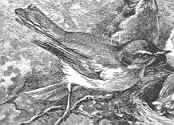I've just finished reading James Boyle's book The Public Domain: Enclosing the Commons of the Mind, which I borrowed from a nearby library. In this book, Boyle discusses the recent evolution of copyright and patent law toward far greater scope (patents) and duration (copyrights) than in the past, why these developments are not beneficial, and how those who are of a mind to oppose these trends might do so. He begins with U.S. Patent #6,004,596 for a "sealed crustless sandwich", and ends with the reaction of the editorial pages of The New York Times and The Washington Post to the Supreme Court's decision in Eldred. v. Ashcroft. In chapter 2 of his book, Boyle introduces the Jefferson Warning, a set of five theses that he advises should be read like a Miranda warning to anyone attempting to influence intellectual property policy. These can be paraphrased as follows
(1) Copyrights and patents reach to intangibles, which are different from tangibles. Because of the nature of intangibles, the rights in them are state-granted monopolies, not natural rights.
(2) There is no entitlement to have one of these monopolies. They are granted merely as matters of public policy.
(3) These monopolies have, and ought to have, time limits, and these limits ought to be moderate, lasting no longer than necessary to achieve the policy objectives for which the monopolies are created.
(4) These monopolies impose costs on society as well as benefits, and it is possible in some cases for the costs to outweigh the benefits.
(5) The optimum limits of these monopolies' scope and duration require careful thought and analysis, during the course of which the four prior theses must be kept constantly in mind. In particular, "more" scope or duration is not always "better" for society.
I think this could just as well be called the Madison warning, or the Madison-Jefferson warning, since both Madison and Jefferson reflected, in their writings, on the importance of limits in state-granted monopolies.
Chapter 3 of Boyle's book is captioned by this delightful poem, which Boyle has been able to trace back (in a variant version) at least to 1821, though he thinks it may be older:
The law locks up the man or woman
who steals the goose from off the common
but leaves the greater villain loose
who steals the common from off the goose.
The law demands that we atone
when we take things we do not own
but leaves the lords and ladies fine
who take things that are yours and mine.
The poor and wretched don't escape
if they conspire the law to break;
this must be so but they endure
those who conspire to make the law.
The law locks up the man or woman
who steals the goose from off the common.
And geese will still a common lack
till they go and steal it back.
The poem seems to presuppose that "law" will be pronounced "lore."
The goose-poem reminds me of some other poems, by John Byrom (1692-1763), which, though less exalted in subject matter than the goose-poem above, are applicable to debates about copyright and patent. At the time these verses were written (1748), the long-dead poet John Milton (1608-1674) had been accused of copying from other poets, accusations later proved false. Byrom's answer, written during the time the accusations were still considered plausible, is a humorous "so what if he did?", to be spoken by a series of schoolboys at their school's commencement ceremony:
THE SECOND BOY:
When Milton's ghost into Elysium came
to mix with claimants for poetic fame,
some rose the celebrated bard to meet,
welcom'd and laid their laurels at his feet.
"Immortal Shades," said he, "if aught be due
to my attempts, 'tis owing all to you;"
Then took the laurels fresh'ning from his hand,
and crown'd the temples of the sacred band.
Others in crowds stood muttering behind--
"Who is the guest? He looks as he were blind."--
"Oh! this is Milton, to be sure, the man
who stole from others all his rhymeless plan;
from those conceited gentlemen, perchance,
who rush to hail him with such complaisance.
Ay, that's the reason of this fawning fuss.
I like him not--HE NEVER STOLE FROM US."
THE THIRD BOY:
Crime in a poet, sirs, to steal a thought?
No, that 'tis not. If it be good for ought,
'tis lawful theft. 'Tis laudable to boot.
'Tis want of genius if he does not do't:
The fool admires--the man of sense alone
Lights on a Happy Thought--and makes it all his own,
flies like a bee along the muse's field,
peeps in and tastes what ev'ry flow'r can yield,
free, from the various blossoms that he meets,
to pick and cull, and carry home the sweets;
while midst a thousand sweets the stingless drone,
sluggishly saunt'ring forth, makes none of them his own.
Subscribe to:
Post Comments (Atom)



No comments:
Post a Comment